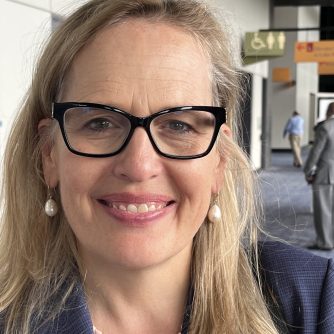An interview with: Jefferson DeKloe BSc, Department of Otolaryngology, Thomas Jefferson University, Philadelphia, PA
CHICAGO, USA—Although the take-up of vaccination for human papilloma virus (HPV) among girls and boys in the USA has been lower than in many other industrial countries, American researchers have now shown clearly that in addition to the prevention of cervical cancer in women, men have also been protected against HPV-related cancers.
At the 2024 American Society of Clinical Oncology Annual (ASCO) Meeting in Chicago a new study of HPV vaccination of girls and boys in the United States revealed a real-world reduction of oral, plus head and neck cancers in men, as well confirming the prevention of cervical cancers in women, even though uptake of the vaccine in the US had been sub-optimal. The study looked at HPV-associated cancer incidence in a retrospective cohort analysis of patients from the TriNetX Collaborative Network.
At the ASACO meeting Peter Goodwin met up with the lead author of the research, Jefferson DeKloe BSc, from the Department of Otolaryngology at Thomas Jefferson University in Philadelphia USA.
Audio Journal of Oncology, with: Jefferson DeKloe BSc
IN: “HPV Vaccination …..OUT: ……, I’m Peter Goodwin”. 6:00secs
https://meetings.asco.org/abstracts-presentations/231759
“Effects of HPV vaccination on the development of HPV-related cancers: A retrospective analysis of a United States-based cohort.”
https://ascopubs.org/doi/10.1200/JCO.2024.42.16_suppl.10507
Effects of HPV vaccination on the development of HPV-related cancers: A retrospective analysis of a United States-based cohort.
ALSO:
https://www.sciencedirect.com/science/article/pii/S1043661825002762
HPV vaccination and malignancy risks beyond cervical cancer: A retrospective global cohort study
Authors: Christian Seebauer, Mohamed Faluogy, Peter Sieg , Henning Olbrich, Ralf Ludwig
Department of Oral and Maxillofacial Surgery/Plastic surgery, University Medicine Lübeck, Ratzeburger Allee 160, Lübeck 23538, Germany
Department of Dermatology, Allergy, and Venerology, University of Lübeck, Ratzeburger Allee 160, Lübeck 23538, Germany
Department of Dermatology, Allergy, and Venerology, Institute of Experimental Dermatology, University of Lübeck, Comprehensive Center for Inflammation Medicine, University-Hospital Schleswig-Holstein, Ratzeburger Allee 160, Lübeck 23538, Germany
Received 28 April 2025, Revised 5 July 2025, Accepted 6 July 2025, Available online 11 July 2025, Version of Record 14 July 2025.
HPV vaccination significantly reduced hypopharyngeal and laryngeal cancer risk.
Vaccination was associated with a marked decrease in leukemia incidence.
No significant protection observed for rectal, anal, or oral cavity cancers.
HPV vaccination halved all-cause mortality at 8- and 20-year follow-up.
Data support possible HPV involvement in hematopoietic and neuronal tissues.
Abstract:
While HPV vaccination is well established for the prevention of cervical cancer, its broader oncological effects remain insufficiently characterized. Emerging evidence suggests potential protective effects against non-cervical malignancies; however, comprehensive long-term data are limited. We conducted a global, retrospective cohort study utilizing electronic health records from the TriNetX network. Individuals vaccinated against HPV at age 8 years or older were propensity score-matched to unvaccinated controls. Outcomes included the incidence of malignancies in the head-and-neck, gastrointestinal, anogenital, neuronal, and hematologic systems, as well as all-cause mortality, assessed over 8- and 20-year follow-up periods. Kaplan–Meier survival analysis and hazard ratios (HRs) were employed. HPV vaccination was associated with significant reductions in the risk of hypopharyngeal and laryngeal carcinomas (8-year HR: 0.19; 95 % CI: 0.057–0.631; p = 0.0025; 20-year HR: 0.227; 95 % CI: 0.067–0.764; p = 0.0092) and leukemia (8-year HR: 0.461; p = 0.0035; 20-year HR: 0.443; p = 0.0019). No significant protection was observed for rectal, anal, oral cavity, or prostate cancers. All-cause mortality was reduced by nearly half among vaccinated individuals (8-year HR: 0.543; 20-year HR: 0.536; both p < 0.0001). Beyond epithelial malignancies, HPV vaccination may confer systemic cancer protection, particularly in hematologic and potentially neuronal tissues. These findings suggest a broader biological impact of HPV vaccination than previously recognized and underscore the need for mechanistic studies investigating HPV’s oncogenic pathways. If validated, these results could prompt the expansion of vaccination strategies to encompass broader indications and wider population coverage.








